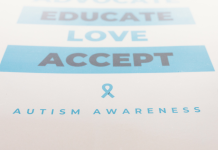 If you are stuck in the trenches of toddler tantrums and losing your mind wondering how you will survive it all, you are not alone. With two young kids in my house (a 4-year-old and a 17-month-old), I am no stranger to the constant battle that is the growing and developing toddler’s brain.
If you are stuck in the trenches of toddler tantrums and losing your mind wondering how you will survive it all, you are not alone. With two young kids in my house (a 4-year-old and a 17-month-old), I am no stranger to the constant battle that is the growing and developing toddler’s brain.
I’ve done it all. I’ve cried, I’ve yelled, I’ve stooped to the maturity level of my child. Believe it or not, sometimes I’ve even remained completely calm and handled the situation like a complete goddess warrior worthy of a mom of the year trophy (few and far between, but it has happened, I swear). The honest truth is most days I fall somewhere in between all of these.
Toddlers aren’t just being jerks (most of the time)
The amount of change and growth going on in a young child’s brain is amazing. Even though their brains will still be nowhere near developed, they are learning the beginning of the world around them. Rational thinking (or something resembling that), problem-solving, feelings, emotions, and not to mention all the things we as parents and educators feel they need to be learning to stay “on track”. It is a lot!
Ever watch your child have a meltdown over something that makes you think the world is playing a practical joke on you? These tantrums that happen aren’t just because your child wants to punish you and make you suffer. They are because kids feel things hard. Their brains are in a constant state of overdrive and overstimulation. Taking time to start connecting to how their brains work and keeping that in mind even when parenting, especially through those toddler tantrums, has helped me survive the hard moments.
Why listen to me? Good question
I am not a parenting expert, but I have also been doing the incredibly important job of raising children for four-plus years now. It is not easy. Little decisions feel stressful. My husband and I had very different struggles, which made it even more challenging. He dreaded bedtime and conflict would ensue almost nightly. I struggle with the line between supporting and coddling and not being affected when my eldest throws an insult meant to cut deep (the dreaded “I don’t love you mommy” or “I don’t care for you”).
Actually applying what I learned from my degree in Human Development and Family Studies help me make the connection between behaviors and reactions. Lucky for me, I find the human brain and stages of development fascinating and could talk about it all day. I pulled out my old textbooks, found new readings, and worked to connect what I knew about my children, where they are developmentally, and how they are processing information to assist in managing these moments.
Here comes the advice…
Since my oldest, my sweet M, was born, he has been bubbling over with emotion. It has always been clear to me this is an ingrained part of his personality. It is such a wonderful thing, that I would never call a flaw, but it comes with challenges as any personality does. He loves hard, regularly telling people he has just met that he loves them, calling everyone his best friend, and constantly pointing out the beauty in all that he sees.
The challenge with these strong emotions is that it comes with other feelings too, like anger, frustration, and devastating sadness. I would never strive to change him or give him any impression his feelings aren’t valid.
If you were waiting for how to apply this to your kids, here it comes. Here are my few trinkets of advice on how to try to keep the peace and how to enrich and develop your child’s sense of self. Now trust me when I say I could go on for hours, but here are the spark notes.
Try to think about where they are coming from
I cannot stress this enough. This may be a radical idea, but your child is a human being. This can be a delicate balance with a child. Do not talk to them as an adult and expect them to get it. On the other hand, understand that they do have thoughts and feelings and even though they may not always make sense to you, they are valid.
When all else fails and you can’t possibly fathom where they are coming from, then I suggest asking them. You won’t always get a logical answer, dare I say, most of the time you won’t. What you will be doing is building their autonomy and making it clear their thoughts and feelings matter.
In our house, we made the switch to talking about the emotion behind the action. We stress that emotions aren’t bad, they aren’t taboo, and they demand to be felt. BUT we also stress the importance of finding a healthy way to express emotions. When we see moments getting escalated, we always try to take a step back and take 3 deeps breaths.
Yell Less
I promise you, I am not judging anyone for yelling. Let’s get this out in the open right off the bat, I also yell. I try really hard not to, but it happens. Sometimes I lose my temper. I will note that I do make a point to say sorry to my children for yelling after we all calm down, it’s a healthy dose of “sometimes mom and dad make mistakes too, especially when it comes to hard emotions”. As a general rule, we try to only yell when our children are in harms way or harming others.
Basically, when I can avoid it, I skip the yelling and talk it out. I ask questions. How are you feeling? I relate to the action or feeling. I would be mad too if I built an awesome Lego house and T came and sat on it. Then we discuss what he needs based on the action. Do we need some time to sit and calm down and work through the emotions?
Your words are their internal monologue
Something that really stood out to me when reading the book Parent Speak, was the idea that parents are the most frequent voice that children hear early on in life and so they become their children’s internal monologue. We are guiding how they learn, so like it or not our words become their words. We reinforce the actions and thought processes of our children and with this power comes great responsibility.
An example of this that really struck me in our house was a bedtime incident. Bedtime is a challenge in our house. Everyone is tired, us parents are just begging for some time to do our own thing; emotions run high. Miles was having a meltdown where he wasn’t listening to us and we could not rationalize with him. Feeling like he wasn’t getting through to Miles at all, my husband steps out of the room and says “I will give you some time to calm down, you can come talk to me when you are ready” (GO DAD GO! ). After a couple of minutes, Miles comes out of his room quietly, sits down right next to his dad, and says “I want to talk about my feelings.” From there, they were able to salvage the bedtime routine.
Words can be tools or weapons
When I found out about this beautiful moment, I almost broke down sobbing. It was a moment of beautiful affirmation that we were getting through. But more fascinating, I saw him talking about things we had been saying to him and working on with him and using them as tools. The flip side of this magic idea is that other than giving our children these tools, we could very easily be dealing with weapons too, so I will say it one more time for those in the back, YOUR WORDS HAVE SO MUCH POWER. Be careful and intentional in how you use them. The mantra we used to use to help us in times of crisis is ‘you can’t teach no yelling by yelling’.
Read a good book
I know I lost some of you here, including my dear husband. I know, I know, there are not enough hours in the day. Hear me out. Other People have put in the hours. They have done the research. I highly recommend finding a book that aligns with your views and check it out, most have an audiobook version too.
My Footnote about parenting books:
While books are my favorite parenting tools, just because it is written doesn’t make it true. There are so many out there. I have gotten some of the best insight from books I don’t agree with. Read them, challenge them, and find what works for you. Research the people writing books and put into consideration their specialties and background when thinking about the book.
My favorite books to reference that have helped me survive the toddler years:
- No-Drama Discipline written by Daniel J. Siegel, M.D. and Tina Payne Bryson, Ph.D.
- 1-2-3 Magic written by Thomas W. Phelan, Ph.D.
- The Whole-Brain Child written by Daniel J. Siegel, M.D. and Tina Payne Bryson, Ph.D.
- Raising Boys to be Good Men written by Aaron Gouveia
- ParentSpeak written by Jennifer Lehr
Again, this does not mean I agree with everything in these books, but it means I have found some amazing nuggets in all of them that have helped me make it through.
You got this
There is no perfect system, every parent and child is different. Ultimately, in my opinion, listen more, yell less, and ask your kids questions. These practices take time and I know sometimes it feels like they are melting down just to be cruel. Their toddler tantrum is not a reflection of you as a parent (so tell those judgy eyes at the grocery store to keep on moving). I have referenced this a couple times, but there is no better feeling than seeing your change take roots. You can do this. You will find a survival method that works for you and your children, but remember you will make it through the trenches!











[…] The temper tantrums […]